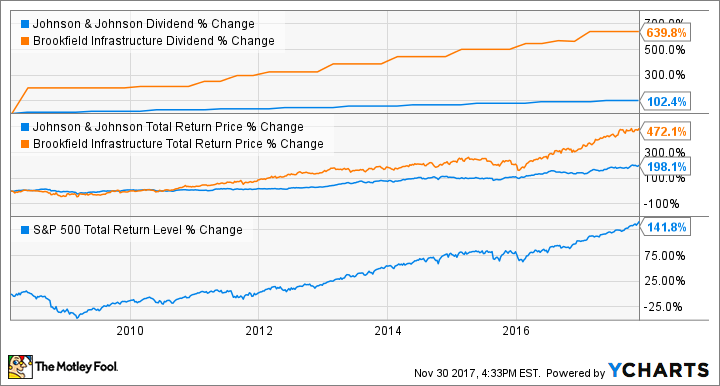3 Dividend Stocks That Pay You More Than Johnson & Johnson Does
Johnson & Johnson (NYSE: JNJ) has one of the sturdiest, longest-running dividends on the market. But many income investors are looking for something better than the 2% annual yield that it provides.
Below, Motley Fool investors highlight a few attractive dividend stocks that could deliver higher cash returns than Johnson & Johnson -- without compromising consistency or growth. Read on to find out why McDonald's (NYSE: MCD), Brookfield Infrastructure Partners (NYSE: BIP), and Altria Group (NYSE: MO) might be better income investments today.
Gorge on profitability growth
Demitri Kalogeropoulos (McDonald's): McDonald's pays about the same yield as Johnson & Johnson today, but its dividend is growing more quickly. The fast-food giant's payout is up 170% over the past decade, compared to a 100% increase for the healthcare titan.

Image source: Getty Images.
That gap is likely to grow over the next few years. After all, McDonald's is enjoying its best operating results since 2012, having just posted back-to-back quarters of 5% or better comparable-store sales growth. Earnings are improving at a much faster rate thanks to a refranchising initiative that, by shifting the sales mix toward royalties and franchise fees, is lifting profitability. Operating margin has risen to 38% of sales over the past nine months from 33% in the prior-year period.
McDonald's executives believe they can get that profitability figure up to the mid-40s by 2019 and over that time they plan to send about $23 billion to investors through dividends and stock buybacks. Their 7% dividend boost constitutes a big down payment on that capital return plan, and it was a fair bit larger than the 5% raise that Johnson & Johnson gave its shareholders for 2017, too.
Light up your portfolio with this dividend giant
Dan Caplinger (Altria Group): At 2.4%, Johnson & Johnson has a respectable dividend yield. But the consumer healthcare and pharmaceutical giant doesn't come close to the 4% yield that you can get from tobacco giant Altria Group. With exclusive rights to sell the Marlboro brand of cigarettes to U.S. customers, Altria has been able to use the popularity of its major cigarette lines to boost prices and sustain profit growth even in the face of declining unit sales demand. Moreover, other business lines include Copenhagen smokeless tobacco, Ste. Michelle wines, and Nat Sherman high-end tobacco products. Investors also get a major stake in beer manufacturer Anheuser-Busch InBev as part of the deal.
For dividend investors, Altria sports a nearly 50-year track record of giving investors consistent and dependable dividend increases. As part of its partnership with its former subsidiary, Altria will also have the exclusive right to license and distribute the iQOS heated-tobacco system to U.S. customers if the system gets approval from regulators at the U.S. Food and Drug Administration. It might seem counterintuitive for Altria to shift away from a business that has been so lucrative for decades, yet based on the success that alternative products have had in many markets across the globe, the U.S. tobacco giant is in a good position to find new growth that will keep its dividends rising in the future.
A cash cow hiding in plain sight
Jason Hall (Brookfield Infrastructure Partners L.P.): Master limited partnership Brookfield Infrastructure Partners' business is simple: own the infrastructure assets that supply energy, transportation, telecommunications, water, and other critical needs for modern society.
On the surface, these are plain, downright boring businesses to be in. But they're also strong cash flow producers, often operating with little, if any, competition and minimal risk from recessions or inflation. They are also typically low maintenance and long-lived assets.
In other words, they can make for absolutely ideal income investments, and that's certainly been the case with Brookfield Infrastructure since it went public almost a decade ago. Over that period, it has crushed Johnson & Johnson in both dividend growth and total returns, while also generating total returns more than three times that of the S&P 500:
JNJ Dividend data by YCharts.
And there's good reason to expect Brookfield Infrastructure to continue its excellent dividend growth and total return performance going forward. In coming decades, the world's population is set to grow by more than 1 billion people, and essentially all of them will live in cities. It's going to take trillions of dollars in new infrastructure investments -- largely the kinds of things Brookfield Infrastructure is good at building and operating -- to support them.
Johnson & Johnson also has a wonderful history and a solid future. But with a much higher yield and a solid path forward for many years of growth, dividend investors should give Brookfield Infrastructure a closer look.
More From The Motley Fool
6 Years Later, 6 Charts That Show How Far Apple, Inc. Has Come Since Steve Jobs' Passing
Why You're Smart to Buy Shopify Inc. (US) -- Despite Citron's Report
Demitrios Kalogeropoulos owns shares of McDonald's. The Motley Fool owns shares of and recommends Johnson & Johnson. The Motley Fool recommends Brookfield Infrastructure Partners. The Motley Fool has a disclosure policy.

 Yahoo Finance
Yahoo Finance 
